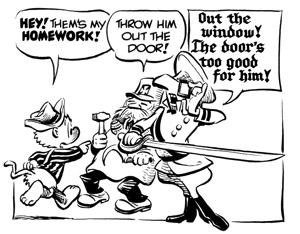
Monday and Wednesday 6:30-9:30
Art + Architecture Bldg. 2043
Gloeckner's e-mail
Gloeckner's web site
School of Art and Design
U of M
• SYLLABUS
• SEMESTER SCHEDULE
• STUDENT PROJECTS, winter 05
fall 04
• PROJECT 1
• PROJECT 2
• COMICS RESEARCH PROJECT
DEVELOPING COMICS ENCYCLOPEDIA: ARTISTS • THEMES
Walt Kelly
by Max Mollhagen-Jaksa
Fall 2004
ARTIST LINK | MORE ARTISTS | COMICS-RELATED TOPICS
Pogo and his friends stand banded together facing a beautiful sunset. One of the darkened shapes says to the other, “It’s a beautiful silhouette, isn’t it?” You’ve now entered the world of Walt Kelly.
Walt Kelly was truly one of the “first generation” American comics artists. Born in 1913 in Philadelphia, Walter Crawford Kelly began his career early at the age of 13. He did political cartoons for a local paper. As his career progressed, he came under the employment of Walt Disney, and worked as an animator on several premiere Walt Disney animated films including Pinocchio, Dumbo, and Fantasia. In 1935, Kelly began working for a comic book company, later to be christened DC Comics. In 1941, Kelly’s own character, Pogo, was born. Pogo (the possum) appeared in a variety of publications beginning with Dell’s “Animal Comics” as a supporting character. In 1948, Pogo has his own strip in the shortly lived New York Star.
The bulk of Pogo’s appearances, however, existed in books instead of papers and periodicals. Many newspaper publishers saw Pogo’s content as overly political and inappropriate for the younger strip reading audiences, Kelly published a number of Pogo-based books including: Pogo, I Go Pogo, The Pogo Papers, Uncle Pogo’s So-So Stories, Pogo Stepmother Goose, Jack Acid Society Black Book, The Pogo Poop Book, We Have Met the Enemy and He is US, The Incompleat Pogo, Pogo Peek-a-Book, Potluck Pogo, Pogo Sunday Book, The Pogo Party, Songs of the Pogo, Pogo’s Sunday Brunch and many more.
In this sense, we could align Kelly with some other early creators who saw the comics medium as a means of expression extending to an audience beyond just children. While Pogo always maintained an innocent enough veneer, there are many points, some clearly pronounced and some subtlety implied that carry heavy political and social undertones. Kelly additionally always maintained a highly formalistic attitude towards his work, often entwining his wit with the formal aspects of the drawings.
Walt Kelly died in 1973. While his work may recede to some of the better-known comics artists in America, his work will forever be a resource and influence to generations of comics artists to come.

Panel from Pogo by Walt Kelly
more Walt Kelly | and yet more